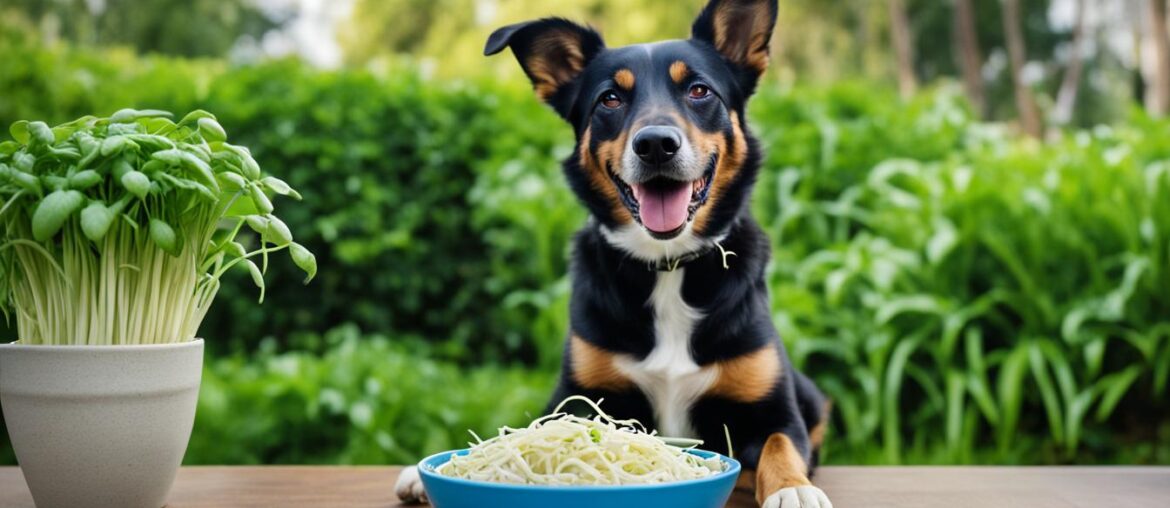As a responsible pet owner, it’s natural to wonder what foods are safe and nutritious for your canine companion. In recent years, there has been increasing interest in incorporating vegetables into dogs’ diets as healthy snacks or supplementary ingredients. Bean sprouts, with their crunchy texture and nutritional profile, are one such vegetable that dog owners may consider adding to their furry friend’s meals.
Bean sprouts are not only delicious but also offer potential health benefits for dogs. They are low in calories and packed with essential nutrients, including vitamins, minerals, antioxidants, fiber, and plant protein. However, before introducing bean sprouts to your dog’s diet, it’s crucial to understand the potential risks and consult with a veterinarian to ensure it aligns with their dietary restrictions and overall nutritional needs.
Key Takeaways:
- Bean sprouts can be a safe and nutritious addition to your dog’s diet when fed in moderation.
- Consult with a veterinarian to ensure bean sprouts are suitable for your dog’s specific dietary restrictions and health conditions.
- Bean sprouts offer various health benefits due to their nutrient-rich composition.
- When feeding bean sprouts, introduce them gradually and monitor your dog’s reaction to avoid any digestive issues.
- Aside from bean sprouts, there are other safe and dog-friendly vegetables you can incorporate into your dog’s diet for additional nutritional diversity.
Are Bean Sprouts Safe for Dogs to Eat?
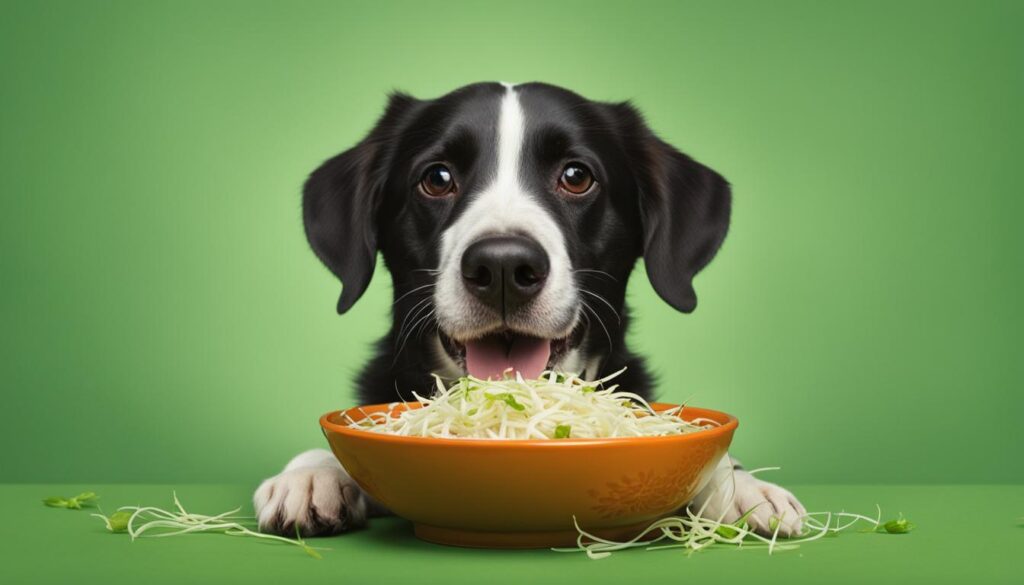
When it comes to canine nutrition, finding safe and healthy food options for our furry friends is crucial. One popular question among dog owners is whether bean sprouts are safe for dogs to eat. Let’s explore the topic of dog-friendly bean sprouts and their place in a dog’s diet.
Bean sprouts are generally considered safe for dogs to consume. They are low in calories and packed with nutrients, making them a healthy choice for a canine snack. However, it’s important to introduce bean sprouts gradually and in moderation to avoid potential digestive issues.
Excessive fiber intake from bean sprouts can cause gastrointestinal problems such as gas and diarrhea in some dogs. Therefore, it’s best to start with small quantities of bean sprouts and closely monitor your dog’s reaction. If they tolerate them well, you can gradually increase the amount.
In addition to introducing bean sprouts in moderation, it’s crucial to wash them thoroughly before serving them to your dog. This step removes any potential bacteria that may be present on the sprouts. Properly washing the sprouts ensures that your dog can enjoy this nutritious snack without the risk of bacterial contamination.
When incorporating bean sprouts into your dog’s diet, it’s important to consider any dietary restrictions your dog may have. Dogs with specific health conditions or dietary restrictions should always consult with a veterinarian before adding bean sprouts or any new food to their diet.
Now that we’ve covered the safety precautions and considerations, let’s take a look at the nutritional benefits that bean sprouts offer for dogs in the next section.
Health Benefits of Bean Sprouts for Dogs
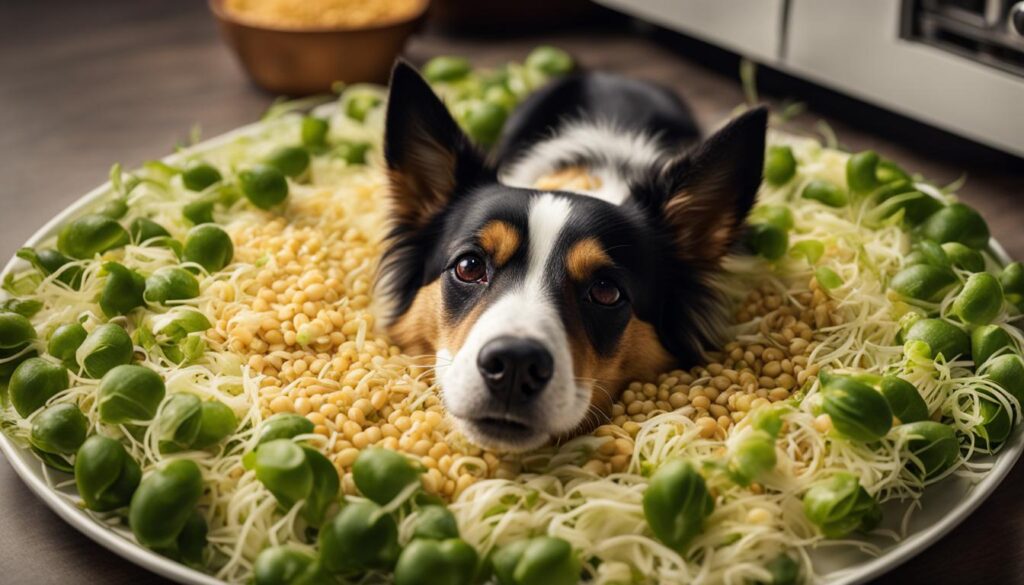
Bean sprouts offer several health benefits for dogs. They are a good source of vitamins and minerals that contribute to improved immune system function, liver and kidney health, cell growth, allergy protection, digestion, and overall well-being in dogs. Incorporating bean sprouts into your dog’s diet in moderation can enhance their balanced nutrition.
Bean sprouts are rich in the following nutrients:
| Nutrient | Benefits |
|---|---|
| Vitamins (B2, B3, B5, B6, B9, B12, C, E) | Enhances immune system function, supports cell growth, aids digestion, and promotes overall well-being |
| Minerals (Iron, Manganese, Calcium) | Contributes to liver and kidney health, bone strength, and overall nutrient absorption |
| Bioflavonoids | Provides antioxidant and anti-inflammatory properties, supports allergy protection |
By adding dog-friendly bean sprouts to their diet, you can offer your furry friend a natural and healthy snack option that supports their well-being.
Quoted Expert Opinion:
“Incorporating nutrient-rich foods like bean sprouts into a dog’s diet can provide essential vitamins and minerals that contribute to their overall health and vitality.” – Dr. Sarah Thompson, DVM
How to Safely Feed Bean Sprouts to Dogs
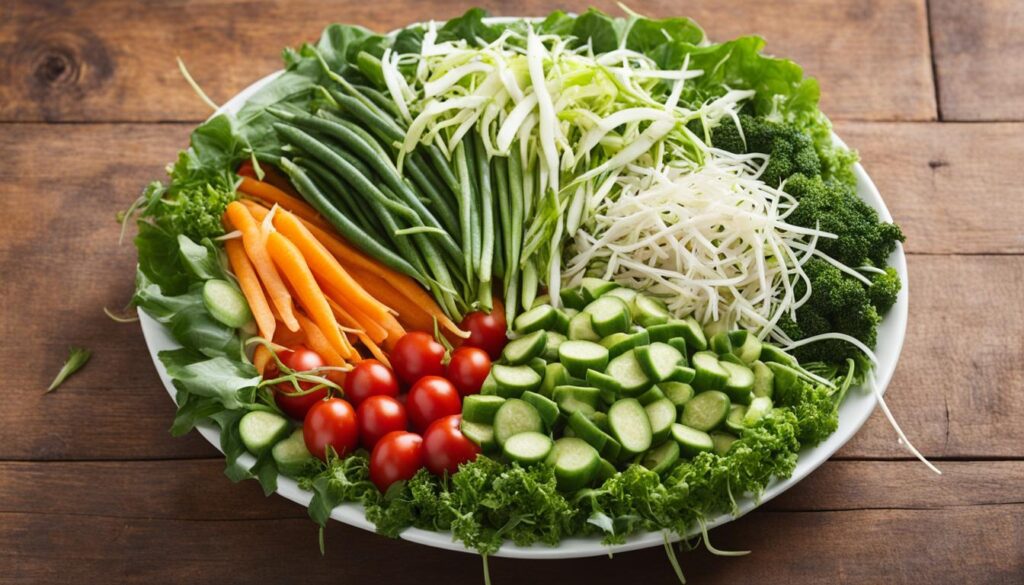
When it comes to incorporating bean sprouts into your dog’s diet, proper preparation is key to ensuring their safety and nutritional value. Follow these guidelines to safely feed bean sprouts to your furry friend:
- Thoroughly wash the sprouts: Before offering bean sprouts to your dog, make sure to wash them thoroughly under running water. This step helps remove dirt, bacteria, and any potential contaminants that may be present on the sprouts.
- Choose raw or cooked: You have the option to feed your dog raw or cooked bean sprouts. Raw bean sprouts can be served as a snack or topping for their regular meals. On the other hand, if you prefer to cook the sprouts, steam them without adding salt. Cooking helps break down the tough outer layer of the sprouts, making them easier to digest for your dog.
- Start with small portions: Introduce bean sprouts slowly into your dog’s diet, starting with small quantities. This allows their digestive system to adjust and reduces the risk of any adverse reactions. Observe your dog for any signs of discomfort or digestive upset after consuming the sprouts.
If your dog shows no negative reactions to the bean sprouts, you can gradually increase the amount over time, always ensuring it remains a small part of their overall diet.
While bean sprouts are generally safe for dogs, it is important to consult with your veterinarian before making any significant changes to your dog’s diet. They can provide personalized advice and take into account your dog’s specific nutritional needs and any existing dietary restrictions or health conditions.
Alternative Vegetables for Dogs
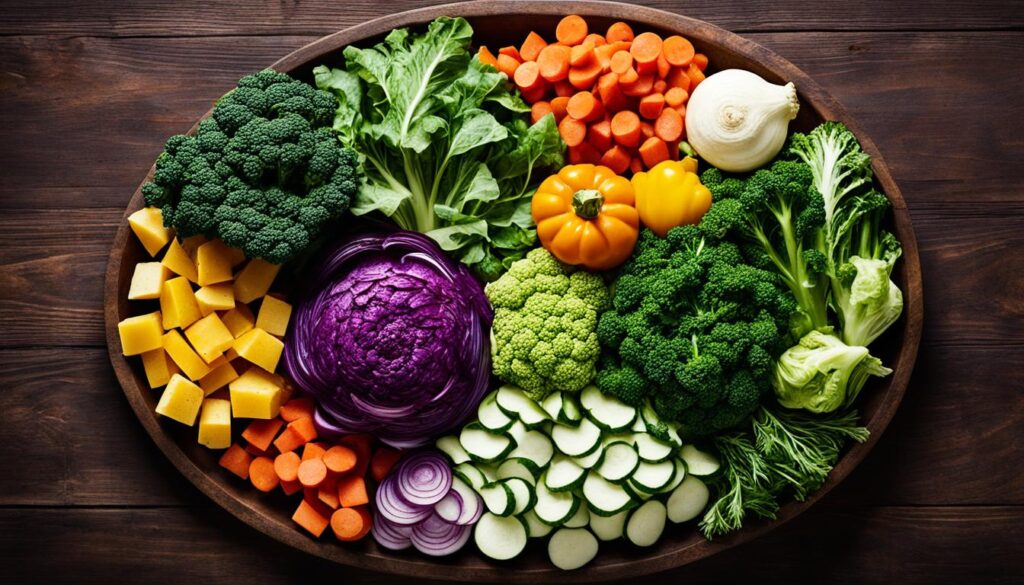
Apart from bean sprouts, there are other vegetables that are safe for dogs to consume. Including a variety of vegetables in your dog’s diet can provide essential nutrients and contribute to their overall well-being. Here are some dog-friendly vegetables that you can incorporate into their meals:
1. Carrots
Carrots are a popular choice for dog owners because they are crunchy, low in calories, and packed with vitamins and minerals. They are a great source of beta-carotene, which promotes healthy skin, coat, and eyesight in dogs. You can serve carrots raw as a snack or cook them for a softer texture.
2. Green Beans
Green beans are another safe and nutritious vegetable for dogs. They are low in calories and high in fiber, making them a good choice for weight management. Green beans also provide vitamins A, C, and K, as well as manganese and folate. Serve them steamed, raw, or as a topping on your dog’s regular food.
3. Sweet Potatoes
Sweet potatoes are rich in vitamins A, C, and B6, as well as dietary fiber. They provide antioxidant properties and can support a healthy immune system in dogs. Sweet potatoes can be cooked, mashed, or baked for your furry friend to enjoy as a tasty and nutritious snack.
4. Pumpkin
Pumpkin is a highly beneficial vegetable for dogs, particularly for digestive health. It is rich in fiber and can help regulate bowel movements, alleviate constipation, and reduce the risk of diarrhea. Make sure to use plain, canned pumpkin without added sugars or spices. Serve it cooked or mixed with your dog’s regular food.
5. Broccoli
Broccoli is a cruciferous vegetable that provides various vitamins, such as vitamin C, K, and A, as well as fiber and antioxidants. It offers immune system support and promotes healthy digestion in dogs. Steam or lightly cook broccoli before serving to make it easier for your dog to digest.
Remember to introduce new vegetables gradually and monitor your dog’s reaction. Every dog is unique, and their tolerance to certain vegetables may vary. Always consult with your veterinarian before making any significant changes to your dog’s diet to ensure they receive the proper nutrition.
| Vegetable | Key Nutrients | Benefits |
|---|---|---|
| Carrots | Beta-carotene, vitamins A, C, and K | Promotes healthy skin, coat, and eyesight |
| Green Beans | Fiber, vitamins A, C, and K, manganese, folate | Helps with weight management, supports immune system |
| Sweet Potatoes | Vitamins A, C, and B6, dietary fiber | Supports immune system, good for digestion |
| Pumpkin | Fiber, vitamins A, C, E, potassium | Aids in digestive health, regulates bowel movements |
| Broccoli | Vitamins C, K, A, fiber, antioxidants | Boosts immune system, promotes healthy digestion |
Precautions and Risks
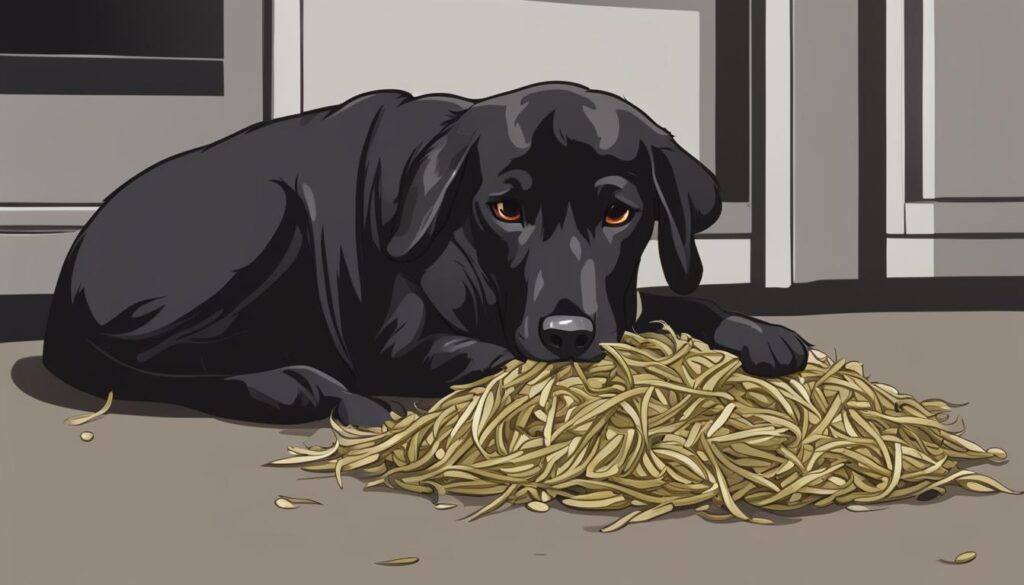
While bean sprouts are generally safe for dogs, there are some precautions and risks to be aware of when feeding them to your furry friends.
- Some dogs may have difficulty digesting fibrous foods like bean sprouts, which can lead to digestive issues such as gas and diarrhea.
- Avoid adding toxic ingredients like onion and garlic to your dog’s bean sprout preparation, as these can be harmful to dogs.
- Additionally, there is a risk of bacterial contamination in raw bean sprouts. It is important to thoroughly wash the sprouts before feeding them to your dog to minimize this risk.
If your dog has any existing dietary restrictions or health conditions, it is best to consult with a veterinarian before introducing bean sprouts into their diet. A veterinarian can provide personalized guidance based on your dog’s specific needs and ensure that bean sprouts are suitable for their overall health and well-being.
Consulting with a Veterinarian about Your Dog’s Diet
When it comes to ensuring the best dietary health for your beloved pooch, it’s always a good idea to seek professional advice from a veterinarian. Consulting with a veterinarian can provide personalized guidance tailored to your dog’s specific needs, considering factors such as age, breed, existing health conditions, and dietary restrictions.
A knowledgeable veterinarian will help you make informed decisions about your dog’s diet, including whether or not to incorporate bean sprouts or other vegetables. They will provide expert recommendations on the appropriate quantity and frequency of feeding these foods, ensuring your dog receives optimal nutrition without any adverse effects.
During your consultation, the veterinarian will take into account any dietary restrictions or allergies your dog may have, ensuring that the food choices align with their individual requirements. They will guide you on how to introduce new foods gradually to your dog’s diet, monitor their reactions, and adjust accordingly.
By collaborating with a veterinarian, you can create a well-rounded and nutritionally balanced diet for your canine companion, keeping them healthy, happy, and thriving.
Wrapping Up
In conclusion, adding bean sprouts to your dog’s diet can be a safe and healthy choice, as long as it is done in moderation and with careful consideration. These nutritious sprouts offer various health benefits for dogs, including essential vitamins, minerals, antioxidants, fiber, and plant protein. However, before introducing bean sprouts to your dog, it is crucial to consult with a veterinarian to ensure it aligns with their dietary restrictions and overall canine nutrition.
Remember that each dog is unique, and their dietary needs may differ. It’s essential to observe your dog’s reaction to bean sprouts and any other new food gradually introduced into their diet. If your dog experiences any adverse effects, such as digestive issues or allergies, it is best to discontinue feeding them bean sprouts and seek guidance from your veterinarian.
Ultimately, prioritizing your dog’s individual needs and health is paramount when making decisions about their nutrition. By working closely with a knowledgeable veterinarian and providing a balanced and varied diet, you can ensure that your furry friend receives the proper nutrients they need to thrive and stay healthy.
FAQ
Can dogs eat bean sprouts?
Yes, dogs can eat bean sprouts. However, it’s important to feed them in moderation and consult with a veterinarian before adding them to your dog’s diet to ensure compatibility with any existing dietary restrictions or health conditions.
Are bean sprouts safe for dogs to eat?
Yes, bean sprouts are generally safe for dogs to eat. They are low in calories and rich in nutrients, making them a healthy snack option. However, it’s important to introduce them gradually and in moderation to avoid gastrointestinal issues.
What are the health benefits of bean sprouts for dogs?
Bean sprouts are a good source of vitamins, minerals, antioxidants, fiber, and plant protein. They can contribute to improved immune system function, liver and kidney health, cell growth, allergy protection, digestion, and overall well-being in dogs.
How do I safely feed bean sprouts to my dog?
When feeding bean sprouts to dogs, it’s important to wash them thoroughly to remove any potential bacteria. Raw bean sprouts can be given as a snack or topping, while cooked sprouts should be steamed without salt to retain their nutritional value. Start with small quantities and gradually increase if there are no adverse effects. Consult with your veterinarian for personalized guidance.
What are some alternative vegetables that are safe for dogs?
Carrots, green beans, sweet potatoes, pumpkin, and broccoli are all dog-friendly vegetables that provide essential nutrients. These vegetables can be cooked, mashed, or served as raw snacks for your dog. Introduce new vegetables gradually and monitor your dog’s reaction to ensure they tolerate them well.
Are there any precautions and risks associated with feeding bean sprouts to dogs?
Some dogs may have difficulty digesting fibrous foods like bean sprouts, which can lead to digestive issues such as gas and diarrhea. It’s important to avoid adding toxic ingredients like onion and garlic to your dog’s bean sprouts preparation. Additionally, there is a risk of bacterial contamination in raw sprouts, so thorough washing is crucial. Consult with a veterinarian if your dog has any existing dietary restrictions or health conditions.
Why is it important to consult with a veterinarian about my dog’s diet?
It’s important to consult with a veterinarian before making any changes to your dog’s diet, including adding bean sprouts or other vegetables. A veterinarian can provide personalized guidance based on your dog’s specific needs, age, breed, and health condition. They can help determine the appropriate quantity and frequency of feeding bean sprouts or other vegetables, taking into account any dietary restrictions or allergies your dog may have.


